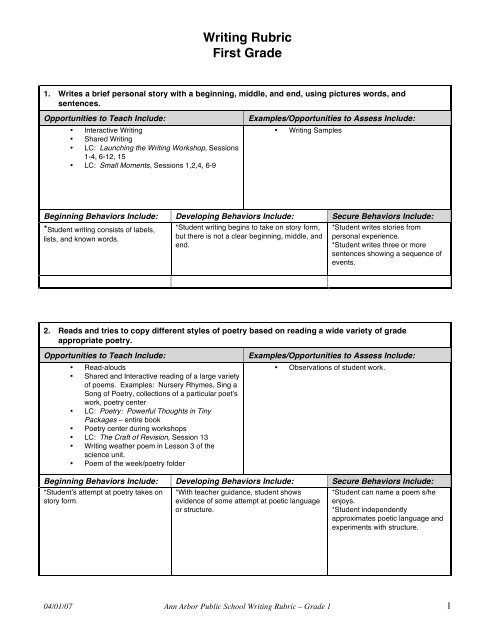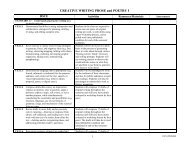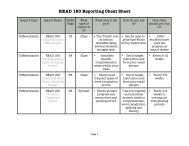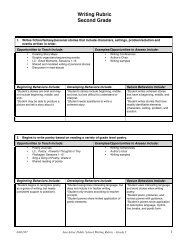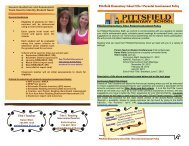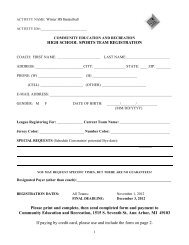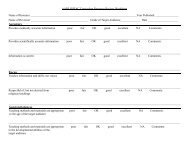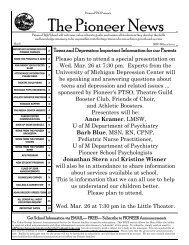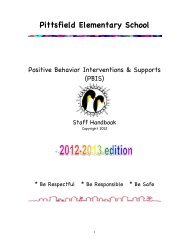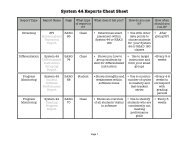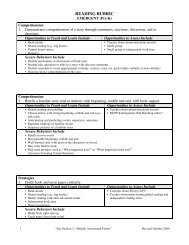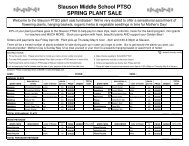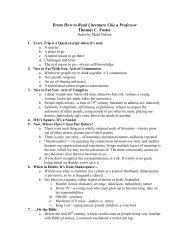Writing Rubric First Grade - Ann Arbor Public Schools
Writing Rubric First Grade - Ann Arbor Public Schools
Writing Rubric First Grade - Ann Arbor Public Schools
Create successful ePaper yourself
Turn your PDF publications into a flip-book with our unique Google optimized e-Paper software.
<strong>Writing</strong> <strong>Rubric</strong><br />
<strong>First</strong> <strong>Grade</strong><br />
1. Writes a brief personal story with a beginning, middle, and end, using pictures words, and<br />
sentences.<br />
Opportunities to Teach Include:<br />
• Interactive <strong>Writing</strong><br />
• Shared <strong>Writing</strong><br />
• LC: Launching the <strong>Writing</strong> Workshop, Sessions<br />
1-4, 6-12, 15<br />
• LC: Small Moments, Sessions 1,2,4, 6-9<br />
Examples/Opportunities to Assess Include:<br />
• <strong>Writing</strong> Samples<br />
Beginning Behaviors Include: Developing Behaviors Include: Secure Behaviors Include:<br />
*Student writing consists of labels,<br />
lists, and known words.<br />
*Student writing begins to take on story form,<br />
but there is not a clear beginning, middle, and<br />
end.<br />
*Student writes stories from<br />
personal experience.<br />
*Student writes three or more<br />
sentences showing a sequence of<br />
events.<br />
2. Reads and tries to copy different styles of poetry based on reading a wide variety of grade<br />
appropriate poetry.<br />
Opportunities to Teach Include:<br />
• Read-alouds<br />
• Shared and Interactive reading of a large variety<br />
of poems. Examples: Nursery Rhymes, Sing a<br />
Song of Poetry, collections of a particular poet’s<br />
work, poetry center<br />
• LC: Poetry: Powerful Thoughts in Tiny<br />
Packages – entire book<br />
• Poetry center during workshops<br />
• LC: The Craft of Revision, Session 13<br />
• <strong>Writing</strong> weather poem in Lesson 3 of the<br />
science unit.<br />
• Poem of the week/poetry folder<br />
Examples/Opportunities to Assess Include:<br />
• Observations of student work.<br />
Beginning Behaviors Include: Developing Behaviors Include: Secure Behaviors Include:<br />
*Student’s attempt at poetry takes on<br />
story form.<br />
*With teacher guidance, student shows<br />
evidence of some attempt at poetic language<br />
or structure.<br />
*Student can name a poem s/he<br />
enjoys.<br />
*Student independently<br />
approximates poetic language and<br />
experiments with structure.<br />
04/01/07 <strong>Ann</strong> <strong>Arbor</strong> <strong>Public</strong> School <strong>Writing</strong> <strong>Rubric</strong> – <strong>Grade</strong> 1 1
<strong>Writing</strong> <strong>Rubric</strong><br />
<strong>First</strong> <strong>Grade</strong><br />
3. Writes a brief informational piece that addresses a focus question.<br />
Opportunities to Teach Include:<br />
• Content area reports<br />
• Class books<br />
• Nonfiction Read alouds<br />
• LC: Nonfiction <strong>Writing</strong>: Procedures and<br />
Reports, Sessions 1, 2-4, 7-11<br />
Examples/Opportunities to Assess Include:<br />
• <strong>Writing</strong> samples<br />
• How To books.<br />
Beginning Behaviors include: Developing Behaviors Include: Secure Behaviors Include:<br />
*Student writing is on topic, but does<br />
not give information. (ie. shares<br />
opinions)<br />
*Student writing contains information, but<br />
lacks structure and organization.<br />
*Student writes a focused piece<br />
that includes headings, titles, or<br />
pictures to help readers understand<br />
the ideas.<br />
4. Helps with a class research project by adding key information gathered from materials supplied by<br />
the teacher.<br />
Opportunities to Teach Include:<br />
• Nonfiction in guided reading<br />
• Content area reading<br />
• LC: Nonfiction <strong>Writing</strong>: Procedures and<br />
Reports, Sessions 7-11, 13<br />
• Time for Kids, Scholastic News<br />
Examples/Opportunities to Assess Include:<br />
• <strong>Writing</strong> Samples<br />
Beginning Behaviors Include: Developing Behaviors Include: Secure Behaviors Include:<br />
*Student needs teacher assistance to<br />
write a sentence that addresses a<br />
focus question.<br />
*Student can list related facts or write a<br />
sentence about the topic.<br />
*Student writes three or more<br />
sentences that address a focus<br />
question.<br />
04/01/07 <strong>Ann</strong> <strong>Arbor</strong> <strong>Public</strong> School <strong>Writing</strong> <strong>Rubric</strong> – <strong>Grade</strong> 1 2
<strong>Writing</strong> <strong>Rubric</strong><br />
<strong>First</strong> <strong>Grade</strong><br />
5. As s/he plans to write, with help from the teacher, considers the audience and purpose for writing.<br />
Opportunities to Teach Include:<br />
• LC: <strong>Writing</strong> for Readers, Session 1, 2, 6, 9-12<br />
• LC: Nonfiction <strong>Writing</strong>, Sessions 2, 3, 5<br />
• Individual <strong>Writing</strong> Conferences<br />
• LC: Revision, Session 7<br />
Examples/Opportunities to Assess Include:<br />
• <strong>Writing</strong> Samples<br />
• <strong>Writing</strong> conferences<br />
Beginning Behaviors Include: Developing Behaviors Include: Secure Behaviors Include:<br />
*Student needs teacher assistance to<br />
make writing possible for others to<br />
understand.<br />
*Student needs considerable teacher<br />
assistance to write for different<br />
purposes such as Small Moments<br />
stories and How-To books.<br />
*Student writing makes sense to the student,<br />
but is not always clear to the reader.<br />
*Student needs teacher prompts and<br />
encouragement to consider the purpose for<br />
writing.<br />
*Student writing is clear and easy<br />
to follow and makes sense to the<br />
reader.<br />
*Student understands the<br />
differences between different<br />
genres such as Small Moments<br />
and How-To books.<br />
6. Begins to develop a plan to generate and structure ideas for narrative and informational text,<br />
including graphic organizers.<br />
Opportunities to Teach Include:<br />
• LC: Launching the <strong>Writing</strong> Workshop: Session<br />
1<br />
• LC: Small Moments: Sessions 1, 2, 4, 7-9, 11<br />
• LC: Nonfiction <strong>Writing</strong>: Sessions 1, 7-11<br />
• LC: Authors as Mentors: Session 10<br />
Examples/Opportunities to Assess Include:<br />
• Observation of pre-writing Behavior<br />
• <strong>Writing</strong> conferences<br />
• <strong>Writing</strong> samples<br />
• <strong>Writing</strong> notebook<br />
Beginning Behaviors Include: Developing Behaviors Include: Secure Behaviors Include:<br />
*Student needs teacher assistance to<br />
plan ideas and organize information.<br />
*Student writing shows evidence of some<br />
planning, but may lack structure or logical<br />
organization.<br />
*Student generates ideas for<br />
narrative and informational text.<br />
*Student plans writing before<br />
beginning (can be done orally).<br />
*Student’s finished piece has a<br />
logical structure.<br />
04/01/07 <strong>Ann</strong> <strong>Arbor</strong> <strong>Public</strong> School <strong>Writing</strong> <strong>Rubric</strong> – <strong>Grade</strong> 1 3
<strong>Writing</strong> <strong>Rubric</strong><br />
<strong>First</strong> <strong>Grade</strong><br />
7. Writes three or more connected sentences using first grade punctuation and spelling.<br />
Opportunities to Teach Include:<br />
• Daily shared and interactive writing<br />
• LC: Launching the <strong>Writing</strong> Workshop, Sessions<br />
7-9<br />
• LC: <strong>Writing</strong> for Readers: Sessions 3, 4, 7-8,<br />
12-14<br />
• LC: Authors as Mentors, Session 15<br />
• LC: Small Moments, session 5, 10<br />
• F & P: HF Lessons 1-8, SP Lessons 1-10<br />
Examples/Opportunities to Assess Include:<br />
• <strong>Writing</strong> Conferences<br />
• LC: Resources CD: Editing Checklist<br />
Beginning Behaviors Include: Developing Behaviors Include: Secure Behaviors Include:<br />
*Student’s finished piece has little or<br />
no appropriate punctuation.<br />
*Student’s finished piece is one<br />
sentence.<br />
*Student writing has some appropriate<br />
spelling and punctuation.<br />
*Student’s finished piece has fewer than<br />
three sentences.<br />
*Student’s finished piece has sentences that<br />
are not connected, or incomplete.<br />
*Student’s finished piece has 3 or<br />
more connected sentences.<br />
*Student’s finished piece has<br />
appropriate punctuation, and<br />
appropriate spelling (see spelling<br />
GLCE).<br />
8. Uses book language when writing stories.<br />
Opportunities to Teach Include:<br />
• LC: The Craft of Revision, Sessions 8-10, 14<br />
• LC: Authors as Mentors, Sessions 3-14<br />
• LC: Small Moments: Session 13<br />
• Read alouds<br />
• Shared <strong>Writing</strong> Experiences<br />
• Shared Reading<br />
Examples/Opportunities to Assess Include:<br />
• <strong>Writing</strong> samples<br />
• <strong>Writing</strong> conferences<br />
• <strong>Writing</strong> class stories<br />
Beginning Behaviors Include: Developing Behaviors Include: Secure Behaviors Include:<br />
*Student’s writing shows no evidence<br />
of story language.<br />
*Student’s writing shows a beginning<br />
awareness of story language, ie. may contain<br />
one or two words.<br />
*Student’s writing has evidence of<br />
story language, ie. Transitional<br />
words, dialogue, and feeling words.<br />
04/01/07 <strong>Ann</strong> <strong>Arbor</strong> <strong>Public</strong> School <strong>Writing</strong> <strong>Rubric</strong> – <strong>Grade</strong> 1 4
<strong>Writing</strong> <strong>Rubric</strong><br />
<strong>First</strong> <strong>Grade</strong><br />
9. Rereads own writing and makes changes to make the meaning more clear for the intended<br />
audience.<br />
Opportunities to Teach Include:<br />
• LC: The Craft of Revision: entire book<br />
• LC: <strong>Writing</strong> for Readers, Sessions 9-11, 15<br />
• LC: Nonfiction <strong>Writing</strong>: Sessions 2-3, 5, 8-13<br />
Examples/Opportunities to Assess Include:<br />
• <strong>Writing</strong> Samples<br />
• Sharing <strong>Writing</strong><br />
• <strong>Writing</strong> conferences<br />
Beginning Behaviors Include: Developing Behaviors Include: Secure Behaviors Include:<br />
*Student is unable or unwilling to<br />
make changes to his/her writing.<br />
*Student can make changes after a writing<br />
conference with the teacher.<br />
*Student makes changes to writing<br />
independently.<br />
*Student can revise after a peer<br />
conference.<br />
10. Uses first grade resources when editing own writing, ie. word lists and class checklists.<br />
Opportunities to Teach Include:<br />
• LC: Launching the <strong>Writing</strong> Workshop: Session<br />
10<br />
• LC: <strong>Writing</strong> for Readers, Sessions 8, 12, 13<br />
• LC: Nonfiction <strong>Writing</strong>, Session 14<br />
• LC: Authors as Mentors, Session 15<br />
• Word walls<br />
• Word chunk charts<br />
Examples/Opportunities to Assess Include:<br />
• Group writing<br />
• Observation during writing<br />
Beginning Behaviors Include: Developing Behaviors Include: Secure Behaviors Include:<br />
*Student is unable to use class<br />
resources to edit own writing.<br />
*With teacher guidance, student is able to<br />
use resources such as word lists, and class<br />
checklists.<br />
*Student is able to independently<br />
use resources such as word lists,<br />
and class checklists to edit own<br />
writing.<br />
04/01/07 <strong>Ann</strong> <strong>Arbor</strong> <strong>Public</strong> School <strong>Writing</strong> <strong>Rubric</strong> – <strong>Grade</strong> 1 5
<strong>Writing</strong> <strong>Rubric</strong><br />
<strong>First</strong> <strong>Grade</strong><br />
11. Develops a personal style in oral, written, or acted out messages in both narrative and informational<br />
writing. Example: Expresses feelings, uses details, and shows examples<br />
Opportunities to Teach Include:<br />
• LC: Small Moments, Sessions 11-13<br />
• LC: Revision, Sessions 3, 6, 8-10<br />
• LC: Nonfiction <strong>Writing</strong>, Sessions 9-11<br />
• <strong>Writing</strong> Conferences<br />
Examples/Opportunities to Assess Include:<br />
• <strong>Writing</strong> Samples.<br />
Beginning Behaviors Include: Developing Behaviors Include: Secure Behaviors Include:<br />
*Student writing does not include<br />
details or descriptive words.<br />
*With teacher guidance, student is able to<br />
show what a character feels, thinks, or<br />
notices.<br />
*Student begins to include descriptive words<br />
and details.<br />
*Student shows what a character<br />
feels, thinks, or notices., ie. “show<br />
not tell”.<br />
*Student consistently uses<br />
descriptive words and details in<br />
written work.<br />
12. Writes with complete sentences beginning with a capital letter and ending with a period, question<br />
mark, or exclamation point.<br />
Opportunities to Teach Include:<br />
• Daily shared and interactive writing<br />
• LC: Authors as Mentors: Session 15<br />
• LC: <strong>Writing</strong> for Readers, Session 14<br />
• LC: Nonfiction <strong>Writing</strong>, Session 6<br />
Examples/Opportunities to Assess Include:<br />
• LC: Editing Checklist (CD Resources)<br />
Beginning Behaviors Include: Developing Behaviors Include: Secure Behaviors Include:<br />
*Student writing shows little or no<br />
evidence of appropriate capitalization<br />
and punctuation.<br />
*Student begins to use capital letters and<br />
ending punctuation appropriately but is<br />
inconsistent.<br />
*Student consistently begins<br />
sentences with a capital letter and<br />
ends with correct punctuation.<br />
04/01/07 <strong>Ann</strong> <strong>Arbor</strong> <strong>Public</strong> School <strong>Writing</strong> <strong>Rubric</strong> – <strong>Grade</strong> 1 6
<strong>Writing</strong> <strong>Rubric</strong><br />
<strong>First</strong> <strong>Grade</strong><br />
13. Correctly spells one-syllable words s/he sees often from common word families.<br />
Opportunities to Teach Include:<br />
• F & P Phonics Lessons: SP Lessons 3-9, WSA<br />
Lessons 2, 3, 5<br />
• Word work during guided reading<br />
• Five day word study<br />
• Interactive writing<br />
• Word Wall Lessons<br />
• F & P: Word Matters<br />
• ABC Center<br />
• LC: <strong>Writing</strong> for Readers, Session 7<br />
Examples/Opportunities to Assess Include:<br />
• <strong>Writing</strong> Samples<br />
• Phonics Lessons<br />
• ABC Center<br />
• Word Study<br />
Beginning Behaviors Include: Developing Behaviors Include: Secure Behaviors Include:<br />
*Student is unable to spell onesyllable<br />
words correctly.<br />
*Student spells words correctly in isolation,<br />
but is able to transfer this understanding in<br />
written work.<br />
*Buddy tests show inconsistent evidence of<br />
correct spelling of common one-syllable<br />
words.<br />
*Student consistently spells onesyllable<br />
words correctly in writing.<br />
*Student generates multiple words<br />
using knowledge of word families.<br />
*Buddy tests in word study show<br />
evidence of correct spelling for<br />
one-syllable words from common<br />
word families.<br />
14. Uses beginning sounds, word families, or word lists provided by the teacher to figure out how to<br />
spell more words.<br />
Opportunities to Teach Include:<br />
• Create and use word wall, word leists, and<br />
personal word bank.<br />
• F & P: Phonics Lessons, SP Lessons 3-9, WS<br />
Lessons 2, 3, 5<br />
• LC: Launching the <strong>Writing</strong> Workshop, Session<br />
10.<br />
• LC: <strong>Writing</strong> for Readers:, Sessions 4, 7<br />
• LC: Nonfiction <strong>Writing</strong>, Session 14<br />
• F & P: Word Matters<br />
• ABC Center<br />
Examples/Opportunities to Assess Include:<br />
• <strong>Writing</strong> Samples.<br />
• <strong>Writing</strong> Conferences (How did you figure out how<br />
to spell that word?)<br />
• Observing students write, looking for evidence of<br />
word wall, word lists, and/or using a personal<br />
word bank<br />
• Word study<br />
• ABC Center<br />
Beginning Behaviors Include: Developing Behaviors Include: Secure Behaviors Include:<br />
* Student writing is mainly invented or<br />
phonetic spelling without evidence of<br />
knowledge of word families or high<br />
frequency words.<br />
*Student begins to use knowledge of word<br />
families to write words.<br />
*With teacher guidance student can use word<br />
lists or word families to spell words correctly.<br />
*Student explains how he spelled a<br />
new word, ie. “I used could to help<br />
me spell would.”<br />
*Student writes unknown words<br />
with known beginning sound or<br />
word family.<br />
Student’s writing shows evidence<br />
of word solving.<br />
04/01/07 <strong>Ann</strong> <strong>Arbor</strong> <strong>Public</strong> School <strong>Writing</strong> <strong>Rubric</strong> – <strong>Grade</strong> 1 7
<strong>Writing</strong> <strong>Rubric</strong><br />
<strong>First</strong> <strong>Grade</strong><br />
15. Forms upper and lower case letters neatly so that people can read them.<br />
Opportunities to Teach Include:<br />
• F & P: Verbal Path, LKS Lesson 6 p. 151-158<br />
• Daily specific handwriting instruction, ie.<br />
Handwriting without Tears<br />
• <strong>Writing</strong> Portion of the guided reading lesson<br />
Examples/Opportunities to Assess Include:<br />
• <strong>Writing</strong> Samples<br />
Beginning Behaviors Include: Developing Behaviors Include: Secure Behaviors Include:<br />
*Student’s handwriting is difficult to<br />
read.<br />
*Student is able to make letters neatly, but<br />
daily work is inconsistent. Some writing is<br />
still not legible.<br />
*Student completes daily work<br />
neatly so that teacher and others<br />
can read it with ease.<br />
16. Is enthusiastic about writing and learning to write.<br />
Opportunities to Teach Include:<br />
• Teacher models excitement of writing.<br />
• Sharing stories, learning from published authors<br />
and acquiring new writing skills during shared,<br />
interactive, and independent writing.<br />
• LC: End of Unit Celebrations<br />
• Teacher’s daily interest, enthusiasm, and<br />
approval of student writing.<br />
Examples/Opportunities to Assess Include:<br />
• Teacher observation during free choice time<br />
• Teacher observation during writing workshop<br />
• Conferencing with student.<br />
Beginning behaviors include: Developing Behaviors Include: Secure behaviors include:<br />
*Student resists writing activities.<br />
*Student needs individual teacher<br />
assistance in order to produce writing.<br />
*Student is reluctant to share writing<br />
with others.<br />
*Student is off-task during writing<br />
activities.<br />
*Student sometimes shows interest and<br />
willingness to write.<br />
*Student needs teacher encouragement to<br />
begin to write.<br />
*Student shares writing with teacher<br />
encouragement.<br />
*Student begins writing without<br />
hesitation.<br />
*Student perseveres with writing.<br />
*Student willingly participates in a<br />
variety of writing activities each<br />
day.<br />
*Student wants to share writing<br />
with others.<br />
04/01/07 <strong>Ann</strong> <strong>Arbor</strong> <strong>Public</strong> School <strong>Writing</strong> <strong>Rubric</strong> – <strong>Grade</strong> 1 8
<strong>Writing</strong> <strong>Rubric</strong><br />
<strong>First</strong> <strong>Grade</strong><br />
04/01/07 <strong>Ann</strong> <strong>Arbor</strong> <strong>Public</strong> School <strong>Writing</strong> <strong>Rubric</strong> – <strong>Grade</strong> 1 9
<strong>Writing</strong> <strong>Rubric</strong><br />
<strong>First</strong> <strong>Grade</strong><br />
04/01/07 <strong>Ann</strong> <strong>Arbor</strong> <strong>Public</strong> School <strong>Writing</strong> <strong>Rubric</strong> – <strong>Grade</strong> 1 10


